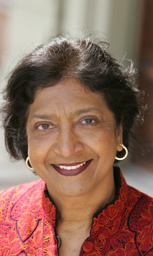
Credit: OHCHR
On the first day of the Human Rights Council’s 24th Regular Session, held in Geneva from September 9 to 27, UN Human Rights Commissioner Navi Pillay identified a broad range of human rights concerns in her opening statement. She discussed both emerging issues and ongoing human rights violations throughout the world while paying specific attention to the “appalling situation” in Syria.
Syria
As the situation in Syria devolves, its citizens continue to suffer serious abuses of their human rights. Pillay stated that “little doubt” remains about the egregious use of chemical weapons in Syria. Emphasizing the necessity of immediate global cooperation she stated, “[t]he International Community is late, very late, to take serious joint action to halt the downward spiral that has gripped Syria, slaughtering its people and destroying its cities.” With over 100,000 dead, 2 million refugees and 4 million displaced persons, States must take action to end the conflict. However, Pillay acknowledged “there are no easy exits, no obvious pathway out of this nightmare.”
Other Country-Specific Concerns
Despite the critical nature of the situation in Syria, Pillay cautioned the Council not to forget the ”sometimes faltering efforts of other peoples, both in the Middle East and elsewhere, to assert their right to live in dignity, peace and security and full recognition of all their rights.”
Levels of violence in Iraq continue to cause concern. With more than 1,800 deaths in the last two months, “the indiscriminate sectarian targeting of civilians is deeply alarming,” Pillay noted. She also expressed concern over Iraq’s continued failure to implement a moratorium on the death penalty and called for a transparent, independent investigation into the killings of 52 people in Camp Ashraf.
The High Commissioner highlighted ongoing violence, killings, and other human rights violations in Egypt, asserting that more inclusive respect for the rule of law would increase stability in the country. While she welcomed the Egyptian government’s expressed readiness to host an OHCHR regional office in Cairo, Pillay was waiting for a response from Egypt to her office’s request to send an assessment mission.
With regard to Bahrain and Turkey, Pillay emphasized that protection of the freedom of assembly, association and expressions must be strengthened. Pillay also expressed regret at Bahrain’s failure to cooperate fully with UN efforts, as well as concern over the excessive use of force by Turkish police. See ECtHR, Izci v. Turkey, no. 42606/05, Judgment of 23 July 2013.
Additionally, the effect of national security surveillance on individuals’ right to privacy remains a pressing concern. In her statement, Pillay urged States, including the United States and the United Kingdom, to implement safeguards to protect the rights of their citizens.
Referencing the substandard treatment of refugees and migrants in Greece and Australia, Pillay reiterated her office’s commitment to protecting the 215 million migrants in the world from human rights abuses.
Further areas of concern in Pillay’s statement include forced evictions in Israel, the excessive use of force by members of the security force in Israel and Palestine, the treatment of Roma in France and Slovakia, and communal violence in Myanmar and South Sudan. Pillay also referred to troubling situations in Sri Lanka, Columbia, Tunisia, the Democratic Republic of Congo, Mali, and the Central African Republic.
Global Economic Crisis
Pillay paid specific attention to the continuing global economic crisis and its negative impact on the ability of nations to realize economic, social and cultural rights for their citizens. As she stated, “millions are without decent work, adequate food, health care, shelter, and the safety net of social security – and thus without hope itself.” Food insecurity, in particular, requires the attention of all Member States, Pillay said.
The recent entry into force of the Optional Protocol to the International Covenant on Economic, Social, and Cultural Rights (ICESCR) represents an effort to reverse this worrying trend.
Human Rights Council’s 24th Session
A general debate on the issues presented followed the High Commissioners opening statement. [OHCHR] Items on the agenda for the remainder of the session include gender integration, the effect on human rights of children whose parents face the death penalty, and children during armed conflict. Some of the reports to be considered include those of the special procedure mandate holders on: hazardous substances and wastes the occupied Palestinian territories, and contemporary forms of slavery. Links to the Council’s provisional agenda, reports to be considered, and calendar for thematic resolutions can be found here.
